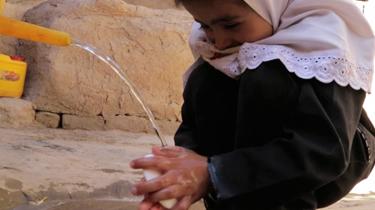KABUL - As part of a United Nations-supported programme, some 1,320 returnees and internally displaced persons (IDPs) - around 200 families - in the north-eastern Afghan provinces of Kunduz and Badakhshan have recently had their understanding on sanitation and environmental hygiene issues boosted as part of a wider effort to help reduce their mortality rates.The programme, Civil Hygienic Awareness (CHA), is implemented by a non-governmental organization, Kunduz Mediothek Community Centre (MCC), with the support of the Office of the UN High Commissioner for Refugees (UNHCR), and also aims to raise awareness of conflict resolution and family management, in addition to better approaches to sanitation and environmental hygiene, among the target families.
“Five trainers, including two men and three women, visit the villages and impart the training to the target audiences,” said the MCC Programme Coordinator, Abdullah Asooli.
He said that the programme covered 100 returnee and 50 IDP families in the Imam Sahib district and Sher Khan Bandar town in Kunduz province and another 70 IDP families in the Wardoj district of neighbouring Badakshan province.
Another 300 families, comprising 1,800 individuals, from the local communities in the neighbourhood of the direct target beneficiaries have indirectly benefited from the CHA Programme, Mr. Rasooli added.
According to a UNHCR spokesperson, Fahim Hamdard, the CHA Programme is part of the UN agency’s Shelter Programme for Afghan returnees and IDPs, which started in early 2002, and has so far provided shelter to more than 19,500 families in the country’s north-eastern provinces.
Under the programme, 20 wells have been dug to provide potable water to the targeted returnee and IDP families. Currently, 20 to 25 families are benefiting from each of these wells.
“I have a family of seven members, it was very difficult for me to build a house. UNHCR is helping us to build a house and it is also educating us on how to keep our environment clean and how to keep ourselves safe from illness,” said one of the beneficiaries in Kunduz, Haji Hanif, who returned to Afghanistan after spending 35 years in Pakistan as a refugee.
A UNHCR trainer, Dr. Rahima, said that the lack of hygienic awareness can lead to the spread of diseases among the communities in the villages.
“Usage of clean potable water, methods of filtering the unclean water, establishing standard toilets by using locally available assets and motivating people to receive vaccines are the key components of hygiene training delivered to the target families to reduce the mortality rate among them,” said Dr. Rahima.
Since 2002, UNHCR has registered 107,241 Afghan returnee families and 1,738 IDP families in the north-eastern provinces of Kunduz, Takhar, Badakhshan and Baghlan.
According to UNHCR, more than 5.8 million Afghan refugees have returned to their homes over the last decade. Today, returnee refugees represent approximately 20 per cent of the country’s population while Afghan refugees living outside the country remain the largest protracted refugee caseload in the world. Still, around 2.5 million Afghan refugees are living in the neighbouring countries of Pakistan and Iran.






